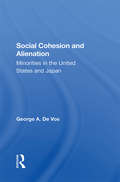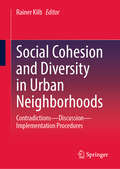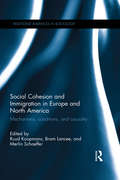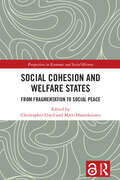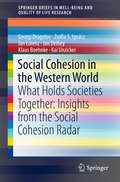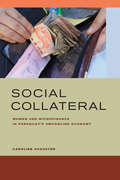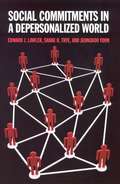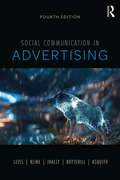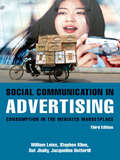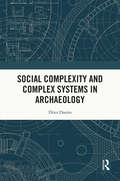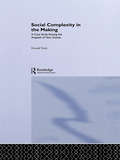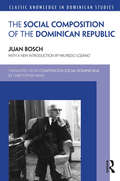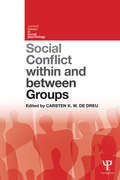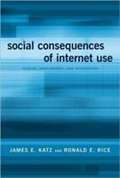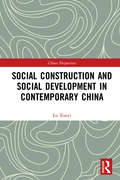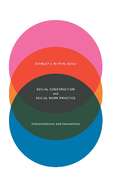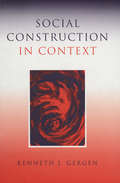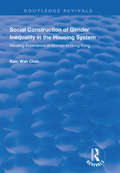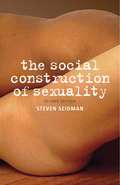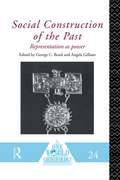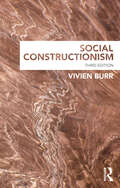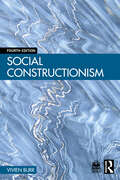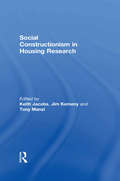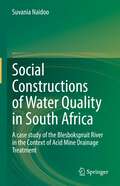- Table View
- List View
Social Cohesion And Alienation: Minorities In The United States And Japan
by George De VosAn attempt at a final summary of much of my work in anthropology has been divided into two separate volumes, Status Inequality: The Self in Culture, 1990, published by Sage Publications and this present volume, Social Cohesion and Alienation: Minorities in the United States and Japan. Many of the themes touched upon in both volumes have appeared in a series of writings that stretch through a period starting in the early sixties through the late eighties. Some of these efforts resulted in books; others appeared separately as invited contributions to symposia, as special issues of journals, or as parts of edited volumes.
Social Cohesion and Diversity in Urban Neighborhoods: Contradictions - Discussion - Implementation Procedures
by Rainer KilbIn the current urban development debate, the vision of a diverse urban neighborhood is often linked with social cohesion as a target aspect of favorable community development. This initially euphemistic connection is in need of explanation, as valid empirical findings suggest that with increasing socio-economic and socio-cultural differentiation, the probability of conflict becomes more pronounced, and social cohesion is likely to decrease. Nevertheless, this connection should be maintained, as social science findings on social polarization and segregation, social segmentation, and fragmentation indicate that urban spatial structures should be designed in such a way that social diversity among residents not only coexists but can also become cooperatively action-oriented within the framework of a community. The resulting conflicts of interest can, in their constructive version, serve as impulses for democratic understanding and decision-making. However, this requires integrative and manageable components, which a well-planned urban neighborhood can provide more effectively than urban sprawl or additive high-density residential silos developed solely for economic yield. How a diverse neighborhood could be planned, designed, implemented, and supported in its community-building process is illustrated and reflected upon using the example of a new neighborhood emerging in Mannheim.
Social Cohesion and Immigration in Europe and North America: Mechanisms, Conditions, and Causality (Routledge Advances in Sociology)
by Ruud Koopmans Bram Lancee Merlin SchaefferConcerns about immigration and the rising visibility of minorities have triggered a lively scholarly debate on the consequences of ethnic diversity for trust, cooperation, and other aspects of social cohesion. In this accessibly written volume, leading scholars explore where, when, and why ethnic diversity affects social cohesion by way of analyses covering the major European immigration countries, as well as the United States and Canada. They explore the merits of competing theoretical accounts and give rare insights into the underlying mechanisms through which diversity affects social cohesion. The volume offers a nuanced picture of the topic by explicitly exploring the conditions under which ethnic diversity affects the ‘glue’ that holds societies together. With its interdisciplinary perspective and contributions by sociologists, political scientists, social psychologists, as well as economists, the book offers the most comprehensive analysis of the link between ethnic diversity and social cohesion that is currently available.
Social Cohesion and Welfare States: From Fragmentation to Social Peace (Perspectives in Economic and Social History)
by Christopher Lloyd Matti HannikainenAiming to go beyond reiterating the stereotypical narrative of the rise of welfare states, this interdisciplinary book examines the long-run historical processes of the development of the welfare state. It focuses on the complex political, social, economic and institutional transformations which give rise to these peaceful and cohesive societies. Welfare is crucial to the story of peaceful social integration and this book explores and explains this vital connection, taking a non-linear view of the history of moving from fragmentation to peace with comprehensive welfare institutions. Chapters collectively focus on three central areas: (a) types of socio-political fragmentation, (b) the interconnection of social, political, and economic forces that led to the institutionalisation of integrationist processes and policies (including re-distributional welfare systems), and (c) how this new institutional development helped achieve, or failed to achieve, social peace and welfare. The international panel of expert contributors provide case studies from a rich variety of country contexts, including Germany, South Africa, the Netherlands, Austria, and the Nordic Countries. This thought-provoking collection of essays is well suited for advanced students and researchers in social history, economic history, political economy and social policy.
Social Cohesion in the Western World
by Jan Delhey Georgi Dragolov Zsófia S. Ignácz Jan Lorenz Klaus Boehnke Kai UnzickerMany people in the Western world are concerned that the social fabric ofsocieties is fraying. This book constitutes the first-of-its-kind systematicaccount of social cohesion, from theory through methodology to empiricalevidence. Readers are introduced to the academically developed Social CohesionRadar of Bertelsmann Stiftung, a globally active non-governmental organization. The Social Cohesion Radar defines and measures cohesion as characterized bythree core aspects: resilient social relations, positive emotionalconnectedness between people and the community, and a pronounced focus on thecommon good. Using high-quality academic and institutional data sources, theSocial Cohesion Radar provides insights into the level and development ofsocial cohesion over a period of almost 25 years internationally, among 34European Union and OECD members, and regionally, among the 16 federal states ofGermany. It further provides insights into what influences cohesion, and whatcohesion is good for. One of the key findings is that social cohesion promotesa happier life for everyone.
Social Collateral
by Caroline E. SchusterMicrocredit is part of a global trend of financial inclusion that brings banking services, especially small loans, to the world's poor. In this book, Caroline Schuster explores Paraguayan solidarity lending as a window into the tensions between social development and global finance.Social Collateral tracks collective debt across the commercial society and smuggling economies at the Paraguayan border by examining group loans made to women by nonprofit development programs. These highly regulated loans are secured through mutual support and peer pressure--social collateral--rather than through physical collateral. This story of social collateral necessarily includes an interwoven account about the feminization of solidarity lending. At its core is an economy of gender--from pink-collar financial work, to men's committees, to women smugglers. At stake are interdependencies that bind borrowers and lenders, financial technologies, and Paraguayan development in ways that structure both global inequality and global opportunity.
Social Commitments in a Depersonalized World
by Edward J. Lawler Jeongkoo Yoon Shane R. ThyeAs individuals’ ties to community organizations and the companies they work for weaken, many analysts worry that the fabric of our society is deteriorating. But others counter that new social networks, especially those forming online, create important and possibly even stronger social bonds than those of the past. In Social Commitments in a Depersonalized World, Edward Lawler, Shane Thye, and Jeongkoo Yoon examine interpersonal and group ties and propose a new theory of social commitments, showing that multiple interactions, group activities and, particularly, emotional attachment, are essential for creating and sustaining alignments between individuals and groups. Lawler, Thye, and Yoon acknowledge that long-term social attachments have proven fragile in a volatile economy where people increasingly form transactional associations—based not on collective interest but on what will yield the most personal advantage in a society shaped by market logic. Although person-to-group bonds may have become harder to sustain, they continue to play a vital role in maintaining healthy interactions in larger social groups from companies to communities. Drawing on classical and contemporary sociology, organizational psychology, and behavioral economics, Social Commitments in a Depersonalized World shows how affiliations—particularly those that involve a profound emotional component—can transcend merely instrumental or transactional ties and can even transform these impersonal bonds into deeply personal ones. The authors study the structures of small groups, corporations, economic transactions, and modern nation-states to determine how hierarchies, task allocation, and social identities help or hinder a group’s vitality. They find that such conditions as equal status, interdependence, and overlapping affiliations figure significantly in creating and sustaining strong person-to-group bonds. Recurring collaboration with others to achieve common goals—along with shared responsibilities and equally valued importance within an organization—promote positive and enduring feelings that enlarge a person’s experience of a group and the significance of their place within it. Employees in organizations with strong person-to-group ties experience a more unified, collective identity. They tend to work more cost effectively, meet company expectations, and better regulate their own productivity and behavior. The authors make clear that the principles of their theory have implications beyond business. With cultures pulling apart and crashing together like tectonic plates, much depends on our ability to work collectively across racial, cultural, and political divides. The new theory in Social Commitments in a Depersonalized World provides a way of thinking about how groups form and what it takes to sustain them in the modern world.
Social Communication in Advertising: Consumption In The Mediated Marketplace
by William Leiss Stephen Kline Sut Jhally Jackie Botterill Kyle AsquithNewly updated for the digital era, this classic textbook provides a comprehensive historical study of advertising and its function within contemporary society by tracing advertising's influence throughout different media and cultural periods, from early magazines through to social media. With several new chapters on the rise of the Internet, mobile, and social media, this fourth edition offers new insights into the role of Google, Facebook, Snapchat, and YouTube as both media and advertising companies, as well as examining the role of brand culture in the 21st century.
Social Communication in Advertising: Consumption in the Mediated Marketplace
by William Leiss Stephen Kline Sut Jhally Jackie BotterillNow available in a significantly updated third edition to address new issues such as the Internet and globalization, Social Communication in Advertising remains the most comprehensive historical study of advertising and its function within contemporary society. It traces advertising's influence within three key social domains: the new commodities industry, popular culture, and the mass media that manages the constellation of images that unifies all three. The third edition includes: * discussion of new technologies and issues, from the Internet to globalization * updated and expanded examples and illustrations * revisions throughout to address recent developments in advertising scholarship and the latest trends in advertising practice
Social Complexity and Complex Systems in Archaeology
by Dries DaemsSocial Complexity and Complex Systems in Archaeology turns to complex systems thinking in search of a suitable framework to explore social complexity in Archaeology. Social complexity in archaeology is commonly related to properties of complex societies such as states, as opposed to so-called simple societies such as tribes or chiefdoms. These conceptualisations of complexity are ultimately rooted in Eurocentric perspectives with problematic implications for the field of archaeology. This book provides an in-depth conceptualisation of social complexity as the core concept in archaeological and interdisciplinary studies of the past, integrating approaches from complex systems thinking, archaeological theory, social practice theory, and sustainability and resilience science. The book covers a long-term perspective of social change and stability, tracing the full cycle of complexity trajectories, from emergence and development to collapse, regeneration and transformation of communities and societies. It offers a broad vision on social complexity as a core concept for the present and future development of archaeology. This book is intended to be a valuable resource for students and scholars in the field of archaeology and related disciplines such as history, anthropology, sociology, as well as the natural sciences studying human-environment interactions in the past.
Social Complexity in the Making: A Case Study Among the Arapesh of New Guinea
by Donald TuzinSocial Complexity in the Making is a highly accessible ethnography which explains the history and evolution of Ilahita, an Arapesh-speaking village in the interior Sepik region of northeastern New Guinea. This village, unlike others in the region, expanded at an uncharacteristically fast rate more than a century ago and has maintained its large size (more than 1500) and importance until the present day. The fascinating story of how Ilahita became this size and how organizational innovations evolved there to absorb internal pressures for disintegration, bears on a question debated ever since Plato raised it: what does it take for people to live together in harmony?Anthropologist David Tuzin, drawing on more than two years fieldwork in the village, studies the reasons behind this unusual population growth. He discovers the behaviour and policies of the Tambaran, the all-male society which was the back bone of Ilahitan society, and examines the effect of the outside influences such as World War II on the village.This work is a unique example of an anthropological case study which will be widely used amongst undergraduates and academics. It provides an excellent insight into techniques of ethnography and contributes to a deeper understanding of what makes a society evolve (and/or collapse).
Social Composition of the Dominican Republic (Classic Knowledge in Dominican Studies)
by Juan BoschComposición social dominicana (Social Composition of the Dominican Republic), first published in 1970 in Spanish, and translated into English here for the first time, discusses the changing structure of social classes and groups in Dominican society from the first encounter between Europeans and Natives until the mid-twentieth century. This influential and pioneering book details the struggles of the Dominican people as they evolved from pre-colonial and colonial subjects to sovereign actors with the task of moving a republic forward, amidst imperialist desires and martial ambitions. Juan Bosch, one of the most well-known and best-loved Dominican politicians and scholars, here sets out the important themes that define modern Dominican society. He tackles topics such as the inter-imperialist rivalry between France, Spain, England, and Holland and its subsequent impact on the Caribbean region, as well as the U.S. occupation of the Dominican Republic from 1916-1924. He also discusses the aftermath of political alliances between liberals and conservatives during the birth of the Dominican Republic, the Restoration War fought against the Spanish Crown, the role of the petit bourgeoisie and the hateros (cattle-ranchers) in the formation of a Dominican oligarchy, the emergence of dictator Rafael Trujillo, and the composition of society during his time in power. This translation, introduced and contextualized by leading Dominican Studies scholar Wilfredo Lozano, opens up Bosch’s work for a new generation of scholars studying the Caribbean.
Social Conflict within and between Groups
by Carsten K. W. De DreuIntergroup competition and conflict create pervasive problems in human society, giving rise to such phenomena as prejudice, terrorism, ethnic cleansing, and interstate war. Citizens, policy makers, social workers, schoolteachers, and politicians wrestle with these problems, and with difficult questions these issues pose: What causes conflict to escalate? How should we manage conflict within communities, and also in society at large? Is conflict always bad, or does it have other more beneficial consequences? Social Conflict within and between Groups provides an overview of contemporary research from the social sciences on these questions. It brings together the research output of a number of leading researchers in psychology, management and economics, sociology and political science, and draws on the outcomes of ten prominent research programs conducted over the past five years. The chapters cover a range of fascinating topics, including prejudice and discrimination in multi-ethnic societies, and conflict and negotiation in the field of industrial relations. The authors also consider the possibilities for intervention at the interpersonal, intergroup and societal level. This is the first volume to provide an interdisciplinary overview of the various scientific approaches to studying the origins and consequences of social conflict. It will be of great interest to researchers, graduates and upper-level undergraduate students from across the social and behavioural sciences.
Social Consequences of Internet Use: Access, Involvement, and Interaction
by James E. Katz Ronald E. RiceAuthors explore the impact of the Internet on society from three perspectives: access to Internet technology, involvement with groups and communities through the Internet, and use of the Internet for social interaction and expression.
Social Construction and Social Development in Contemporary China: Vol. 2 (China Perspectives)
by Xueyi LuWhat is the social structure of Chinese society in the 21st century? How should China address the problem of migrant workers? How can China form a modern society? These key sociological issues are some of the topics this book covers.This book is a collection of the research articles and lectures that Dr. Lu Xueyi, the former Head of the Institute of Sociology at the Chinese Academy of Social Sciences, has published since the 1980s. The author discusses the social structure, social stratification, social construction, and development of contemporary Chinese society. Arguing that the gap between economic and social development has become the major social issue facing modern China, the author advocates paying close attention to the country’s social structure and the growth of the middle class.The book will be of interest to all scholars and students of Sociology and Chinese Studies.
Social Construction and Social Work Practice
by Stanley L WitkinSocial Construction and Social Work Practice
Social Construction and Social Work Practice: Interpretations and Innovations
by Stanley L WitkinSocial construction addresses the cultural factors and social dynamics that give rise to and maintain values and beliefs. Drawing on postmodern philosophies and critical, social, and literary theories, social construction has become an important and influential framework for practice and research within social work and related fields. Embracing inclusivity and multiplicity, social construction provides a framework for knowledge and practice that is particularly congruent with social work values and aims. In this accessible collection, Stanley L Witkin showcases the innovative ways in which social construction may be understood and expressed in practice. He calls on experienced practitioner-scholars to share their personal accounts of interpreting and applying social constructionist ideas in different settings (such as child welfare agencies, schools, and the courts) and with diverse clientele (such as "resistant" adolescents, disadvantaged families, indigenous populations, teachers, children in protective custody, refugee youth, and adult perpetrators of sexual crimes against children). Eschewing the prescriptive stance of most theoretical frameworks, social construction can seem challenging for students and practitioners. This book responds with rich, illustrative descriptions of how social constructionist thinking has inspired practice approaches, illuminating the diversity and creative potential of practices that draw on social constructionist ideas. Writing in a direct, accessible style, contributors translate complex concepts into the language of daily encounter and care, and through a committed transnational focus they demonstrate the global reach and utility of their work. Chapters are provocative and thoughtful, reveal great suffering and courage, share inspiring stories of strength and renewal, and acknowledge the challenges of an approach that complicates evidence-based evaluations and requirements.
Social Construction in Context
by Kenneth J. GergenThis latest book by one the world's leading protagonists in the field will be welcomed not just by psychologists but by students, academics and professionals interested in social constructionism across a wide range of subjects. Social Construction in Context explores the potentials of social constructionist theory when placed in diverse intellectual and practical contexts. It demonstrates the achievements of social constructionism, and what it can now offer various fields of inquiry, both academic, professional and applied, given the proliferation of the theory across the social sciences and humanities. First order issues of concern within the academic world, objectivity, truth, power and ideology, are now being augmented by widespread developments in practice - therapeutic, pedagogical, organizational and political. This book looks closely at these developments and examines both the positive potentials and limitations of social constructionist theory when applied to a variety of domains. It has been written in an accessible and scholarly manner making it suitable for a wide-ranging readership.
Social Construction of Gender Inequality in the Housing System: Housing Experience of Women in Hong Kong (Routledge Revivals)
by Kam Wah ChanFirst published in 1997, this volume recognises the issue of gender inequality in Hong Kong housing. The invisibility of the housing problem is compounded by the dominant patriarchal Chinese culture in Hong Kong. The issue remains marginal in Western countries as well, despite increasing concern. Kam Wah Chan makes meaningful, insightful progress on the housing issue in Hong Kong by focusing on the crucial issues of housing for lone mothers and for women in new towns.
Social Construction of Sexuality
by Steven SeidmanIn The Social Construction of Sexuality , Steven Seidman investigates the political and social consequences of privileging certain sexual practices and identities while stigmatizing others. Addressing a range of topics from gay and lesbian identities to sex work, he delves into issues of social control that inform popular beliefs and moral standards. The Second Edition of The Social Construction of Sexuality features a new part that focuses on sexuality and social institutions.
Social Construction of the Past: Representation as Power (One World Archaeology)
by George Clement Bond Angela GilliamFirst published in 1994. Anthropological and archaeological enquiry are shaped by the historical times in which they are formulated. This collection of essays examines how mainstream scholarship constructs the past - in the case of anthropologists, usually the past of other peoples. By creating another people's cultural history, scholars appropriate it and turn it into a form of domination by one group over another. Mainstream scholarship has often failed to recognize the intellectual and scholarly contribution of subjugated peoples . This volume looks at the way 'postcolonial' scholars are redefining the nature of scholarship, and themselves, in order to develop a more egalitarian discourse. Social Constructions of the Past examines labour, race and gender and its relationship to power and class. It includes essays on a broad range of topics, from the role of intellectuals in restructuring a non-apartheid South Africa, to Haitian working-class women using sexuality to resist domination.
Social Constructionism
by Vivien BurrNow in its third edition, this successful book introduces students to the area of social science theory and research known as social constructionism. Using a variety of examples from everyday experience and from existing research in areas such as personality, sexuality and health, it clearly explains the basic theoretical assumptions of social constructionism. Key debates, such as the nature and status of knowledge, truth, reality and the self are given in-depth analysis in an accessible style. Drawing on a range of empirical studies, the book clearly defines the various different approaches to social constructionist research and explores the theoretical and practical issues involved. While the text is broadly sympathetic to social constructionism, it also adopts a critical perspective to the material, addressing its weaknesses and, in the final chapter, subjecting the theory itself to a more extensive critique. New to this edition: Extended coverage of the relationship between 'mainstream' psychology and social constructionism and how the two fields can engage with each other. An exploration of the rise and popularity of neuroscience and the challenge it poses to social constructionism. New material on the field of psychosocial studies. Updated coverage of existing key issues such as age and sexuality, and inclusion of more recently emerging issues (e.g. status and role of affect). Updated discussion of key social constructionist contributors, with revised references. Updated chapter on research methods, including more on narrative and critical narrative analysis, and personal construct methods. The third edition of Social Constructionism extends and updates the material covered in previous editions and will be an invaluable and informative resource for undergraduate and postgraduate students across the social and behavioural sciences.
Social Constructionism
by Vivien BurrThe fourth edition of this seminal work introduces students to social constructionism. Using a variety of examples from everyday experience and from existing research in areas such as personality, sexuality and health, it clearly explains the basic theoretical assumptions of social constructionism.Drawing on a range of empirical studies, the book clearly defines the various approaches to social constructionist theory and research and explores the theoretical and practical issues they raise. It presents and analyses key debates, such as the nature and status of knowledge, truth, reality, and the self, in an accessible style. The new edition has been updated with relevant and contemporary references to aid understanding of key theoretical and methodological issues. The author additionally utilises new illustrative examples from research and contemporary life, such as the #MeToo movement, BlackLivesMatter, and Post-Truth politics. The updated work has also been expanded to include an extended discussion of affect and embodiment and a number of exercises to help illustrate important concepts.Social Constructionism extends and updates the material covered in previous editions and will be an invaluable and informative resource for undergraduate and postgraduate students of Psychology, Sociology, Education, and other related disciplines.
Social Constructionism in Housing Research
by Jim KemenyBy stressing the importance of subjectivity and interpretation, social constructionism offers a different conception of reality from the traditional approach to housing policy analysis. This book provides an up-to-date review of the social constructionist perspective and considers its philosophical basis. It discusses how social problems are constructed and, in turn, how this informs policy-making. It is divided into two parts. The first section is theoretical and discusses the variety of conceptual approaches utilised within the constructionist paradigm. The second part provides a number of empirically based case studies from the UK and Australia to illustrate the different methodologies that form the social constructionist corpus. The book also evaluates both the criticisms that have been made against the social constructionist perspective and the strengths and weaknesses of constructionist methods. It therefore contributes to the development of a future research agenda for social constructionist research in housing and urban policy.
Social Constructions of Water Quality in South Africa: A case study of the Blesbokspruit River in the Context of Acid Mine Drainage Treatment
by Suvania NaidooThis book details how the water quality of the Blesbokspruit River in Gauteng, South Africa was socially constructed by stakeholders and key individuals in the context of acid mine drainage (AMD) and its treatment. Social constructionism is used as the framing for this research to explain how water is intrinsically social. Findings presented here show that stakeholders are aware that the changes in the physicality of the Blesbokspruit resulted from human interventions and varied uses of the water over the years. Such knowledge, among factors such as the historical context of mining, current coal mining, flows and volumes of water, technology used and processes followed, information and communication, and vested interests influence social constructions of the water quality. What counts as the truth about water varies depending on the individual’s perspective, their purpose, and their individual interests. Further, how one defines water quality influences what treatment processes are preferred in order to improve water quality. The book explains why, for example, a treatment process meant to improve water quality gained a bad reputation by the public because of the South African government’s silo approach. The book explains how these social constructions are entrenched in power relations between stakeholders regarding AMD treatment and illustrates how power was used to influence decisions to improve the water quality of the Blesbokspruit. The case presented in this book offers insights and recommendations for policymakers working in water governance, including means to influence social constructions of water quality and ways to clarify roles and responsibilities in pursuit of improved cooperative government.
